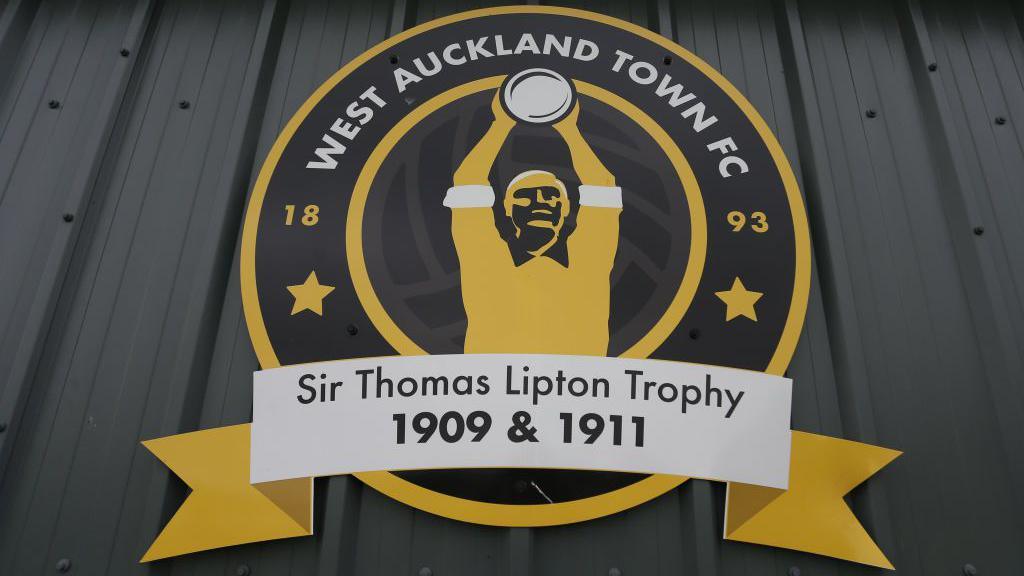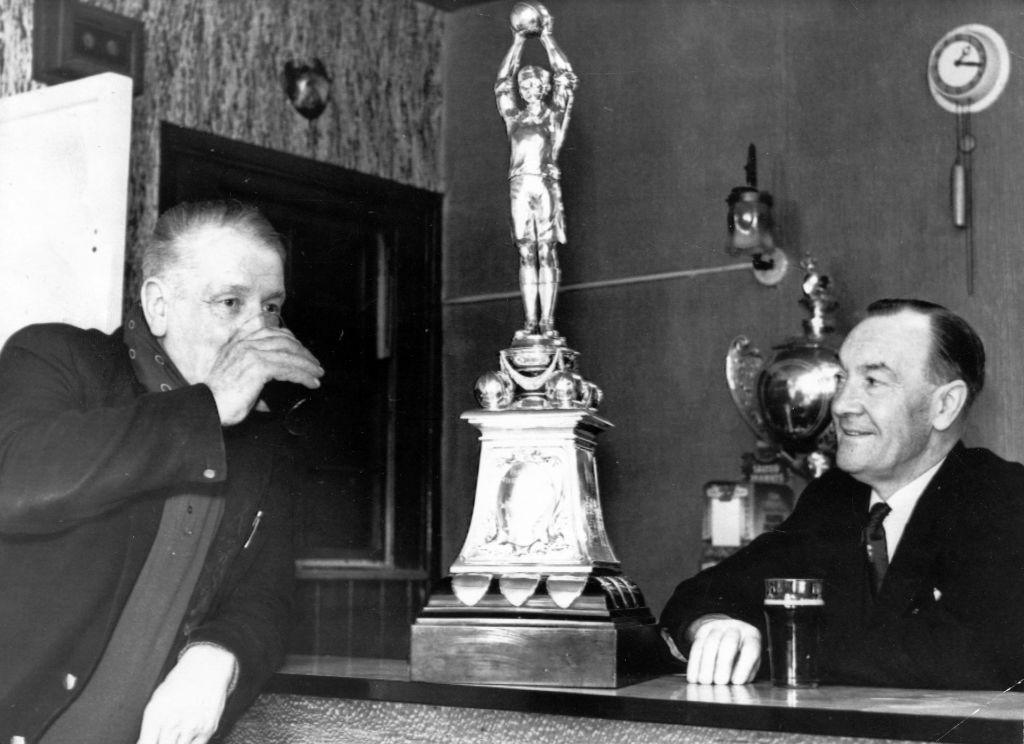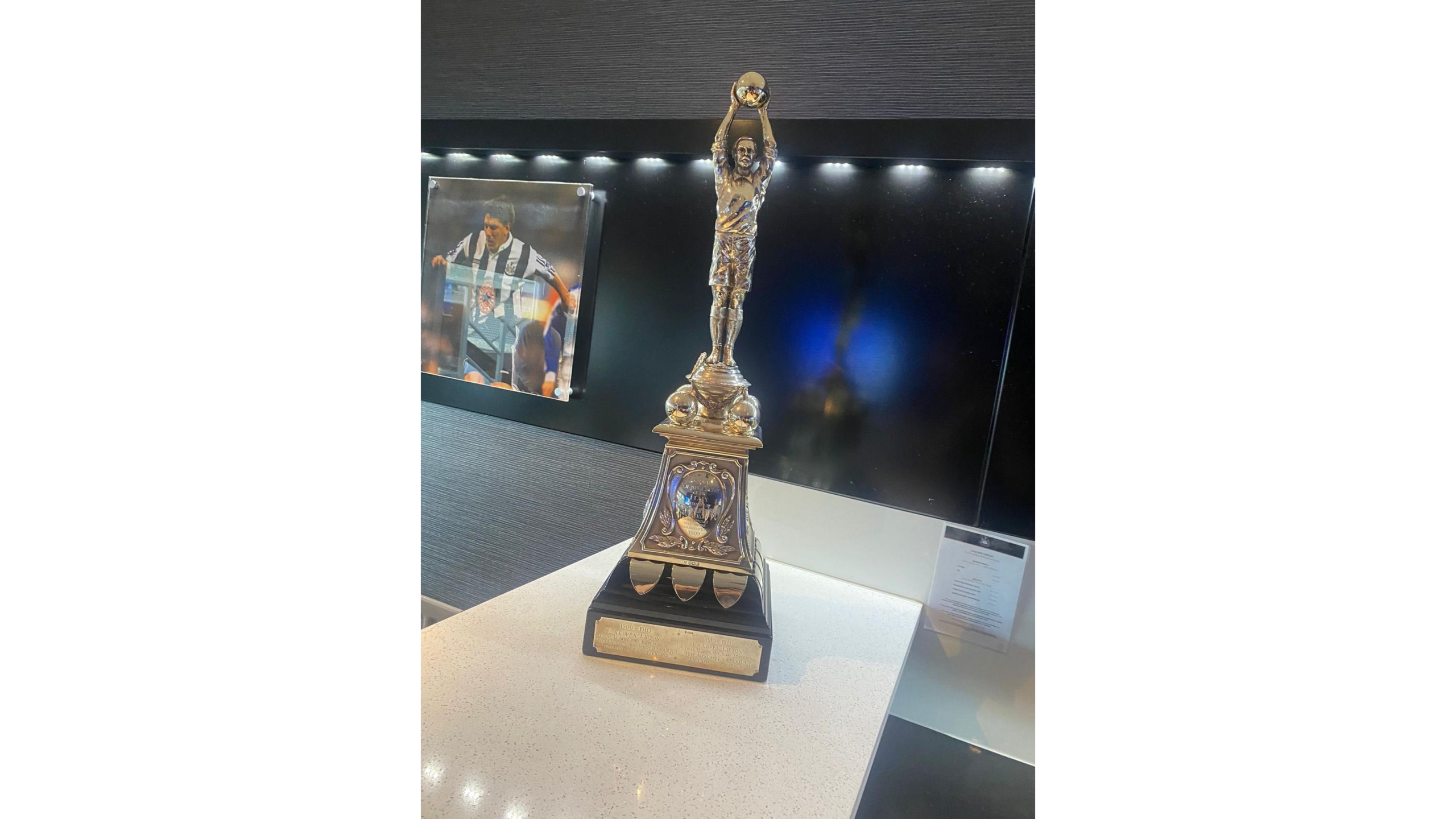The amateur English side who became first world champions

Sir Thomas Lipton was given the Grand Order of the Crown of Italy - and responded by organising the first global football tournament
- Published
Before the big names of Chelsea and Paris St-Germain were going head-to-head in a bid to become champions of the world, an amateur side from County Durham once vied to do the same.
West Auckland Town, of the Northern League Division One, the ninth tier of the English football league structure, are recognised as the first world champions by Fifa.
They earned that crown more than 100 years ago, in 1909, but it is a badge of honour the club have worn with immense pride ever since.
But how exactly did an amateur side, made up of coal miners, end up representing England in a global football tournament?
BBC Sport takes a look...
Sir Thomas Lipton Trophy
Twenty-one years before Uruguay lifted the first Fifa World Cup, there was another attempt to create a global football tournament, with clubs rather than countries.
Sir Thomas Lipton, philanthropist and creator of Lipton Ice Tea, created a football competition that saw Europe's elite face off against each other.
With the competition set to be held in Turin, Italy, invitations were sent to the football associations of England, Germany, Italy and Switzerland - the predominant powerhouses of the game - with all but the English FA accepting the offer to send one of their best teams to take part.
Germany and Switzerland sent their respective champions, Stuttgart and Winterthur, while Italy sent a combined Turin and Piemonte side.
Not wanting to see England go unrepresented at the tournament, Lipton turned his attention to the Northern League and West Auckland Town.
Why exactly the amateur outfit were chosen is a much speculated subject but, according to local historian Martin Connolly, there are a couple of possible scenarios.
"The myth was that Sir Thomas Lipton had asked for Woolwich Arsenal Football Club, WAFC, and his secretary made a mistake, but my research shows that is not correct," he told BBC Real Time in 2014.
"The Northern League was one of the oldest leagues in England with fantastic teams and it's thought that Bishop Auckland might have been the target - but, in fact, West Auckland got the invite."
Mistake or not, amateur side West Auckland duly accepted the invitation and the stage was set for the first World Cup, or, by its official and very creative name, the Sir Thomas Lipton Trophy.

The Sir Thomas Lipton Trophy nearly had to be used as a replacement for the stolen Jules Rimet Trophy in 1966
The journey to becoming champions
West Auckland's players had to pay money out of their own pockets to make the trip, with some reportedly having to sell furniture and other belongings to afford it.
But they jumped at the once-in-a-lifetime opportunity.
They journeyed by bus to Darlington, caught a train to London, before hopping on a ferry to Calais in France and then travelled on to northern Italy, to face German champions Stuttgart. A surprise 2-0 win to set up the final against Swiss side FC Winterthur.
Again, West Auckland notched a 2-0 victory to cement themselves as world champions without even conceding a goal.
"In terms of achievement, this rates as about the best ever," said Connolly.
"When you consider that a mining team, people from the pit, come up out of the pit, go to Turin and beat some of the best teams in the world. Achievement? Major."
Two years later, West Auckland were invited back to defend their trophy - as is only right.
And, incredibly, they won the lot again.
This time around, Torino and Juventus both took part in the tournament and the amateurs from England faced them both.
They edged past Torino 3-2 on Easter Sunday to set up a final against future Italian giants Juventus.
West Auckland triumphed 6-1 to retain their title and were awarded the trophy outright.
A sale and a theft
It wasn't all sunshine and rainbows for West Auckland.
Upon their return home from their second triumph in 1911, the club barely had time to show off their beloved trophy because of financial issues.
Within a year of returning to the north-east, the prize had been sold to a local landlady for £40 to help West Auckland pay off debts.
She held it for 48 years, before selling the trophy back to the club in 1960 for £100.
The club displayed the trophy in the West Auckland Working Men's Club and it remained there until January 1994 - when it was stolen.
The original trophy has never been found. Instead, the club now owns an exact replica.
Yet the theft has not stopped the village shouting loud and proud about their achievement to this day.

In 1982, an ITV drama called A Captain's Tale documented the story of West Auckland's victories
The home of the first World Cup
Should you ever find yourself driving into West Auckland, you will be met by road signs reading: "Welcome to West Auckland - Home of the First World Cup."
There is also a commemorative bronze statue of the victory that has stood proudly on the town's green since its completion in 2013.
More than £200,000 was raised to ensure the statue could be completed and erected near the stadium where West Auckland Town now play their matches.
Robert Yorke was County Councillor for West Auckland when local government reorganisation was implemented in 2008 and said he felt it important to celebrate the "outstanding sporting achievement of West Auckland FC".
"We quickly set about raising funds from local events as well as writing to various arts groups and foundations for donations," Yorke explained.
"Everybody in the village participated and this highlighted how important an achievement this was within our community."
While the story of West Auckland may not be as famous as that of Uruguay 1930, Yorke remains defiant on his answer of who the real first World Cup winners are.
He added: "Although the story of West Auckland FC winning the first World Cup is largely known within County Durham, it's not well known outside the area.
"It was such an achievement back in 1909 for these footballers to raise the money and then travel to Europe to play and then win the world's first football tournament.
"So the next time you are asked who won the first World Cup, you know the answer is West Auckland FC!"
Related topics
- Published31 January
